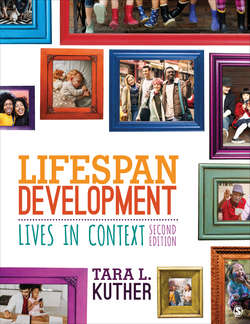Читать книгу Lifespan Development - Tara L. Kuther - Страница 274
На сайте Литреса книга снята с продажи.
What Do You Think?
Оглавление1 Infants and children reared in poverty face many contextual risks to development. Their contexts may also offer opportunities for resilience. Identify factors within the family and home that can promote the development of infants and children who are exposed to poverty.
2 How might the extended family, neighborhood, and community help to buffer the effects of challenging environments on development?
Information processing abilities can be assessed in simple ways that allow us to study intelligence in infants who are too young to tell us what they think and understand. For example, infants’ visual reaction time (how quickly they look when shown a stimulus) and preference for novelty (the degree to which they prefer new stimuli over familiar ones) are indicators of attention, memory, and processing speed and have been shown to predict intelligence in childhood and adolescence (Fagan, 2011). Habituation tasks also provide information about the efficiency of information processing because they indicate how quickly an infant learns: Infants who learn quickly look away from an unchanging stimulus (or habituate) rapidly. Longitudinal studies suggest that infants who are fast habituators score higher on measures of intelligence in childhood and adolescence than do those who are slower habituators (Kavšek, 2013; Rose, Feldman, & Jankowski, 2012). One study demonstrated that, compared with average and slow habituators, infants who were fast habituators had higher IQs and higher educational achievement when they were followed up 20 years later in emerging adulthood.
Many other studies confirm that infant information processing abilities are associated with measures of intelligence throughout life. For example, working memory and visuospatial short-term memory in infancy are associated with IQ in fourth- and fifth-grade children (Giofrè, Mammarella, & Cornoldi, 2013). Working memory and processing speed are also associated with intelligence in children and adults (Redick, Unsworth, Kelly, & Engle, 2012; Rose, Feldman, Jankowski, & Van Rossem, 2012; Sheppard, 2008). Information processing skills in infancy are effective predictors of intelligence in childhood; however, these findings are generally the result of laboratory research. Although pediatricians might test an infant’s attention and habituation as part of an examination, there is no standardized information processing test of intelligence to apply to infants comparable to the Bayley-III.
